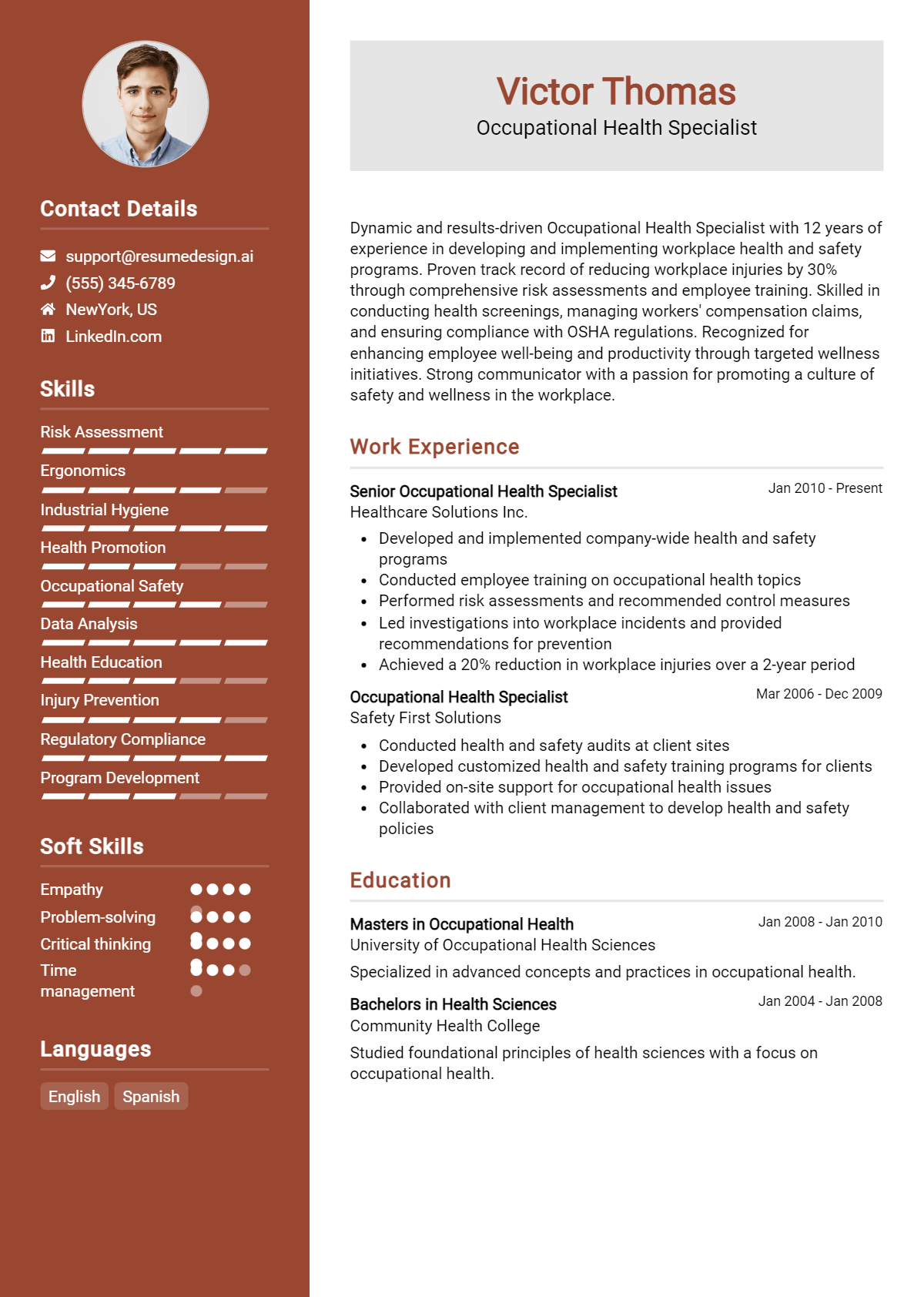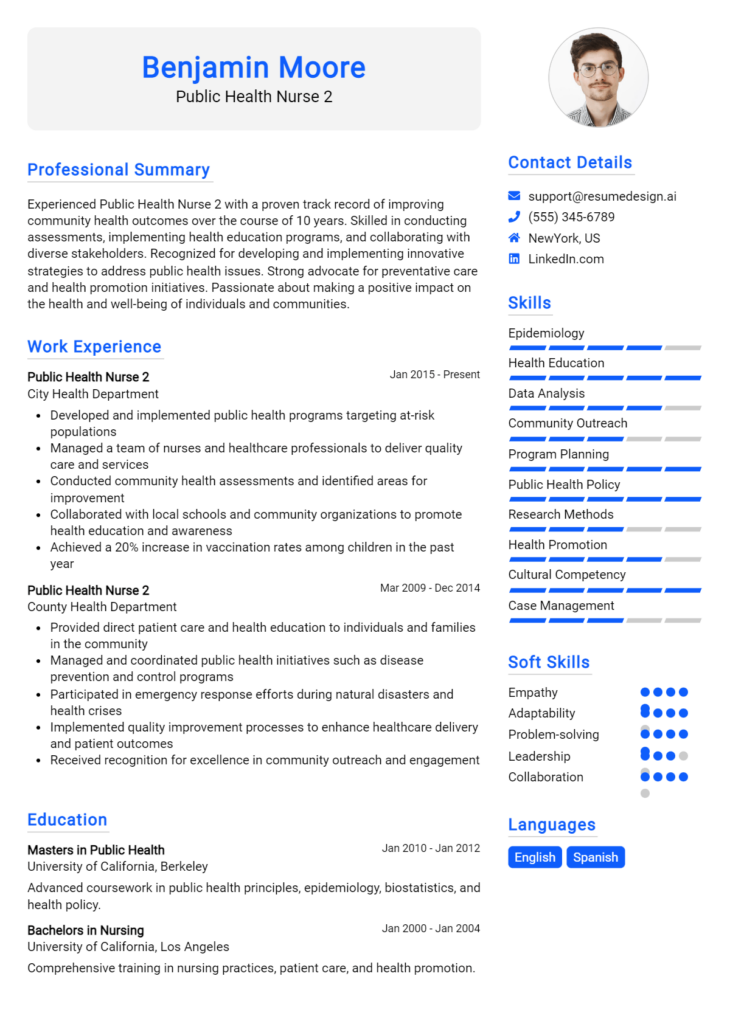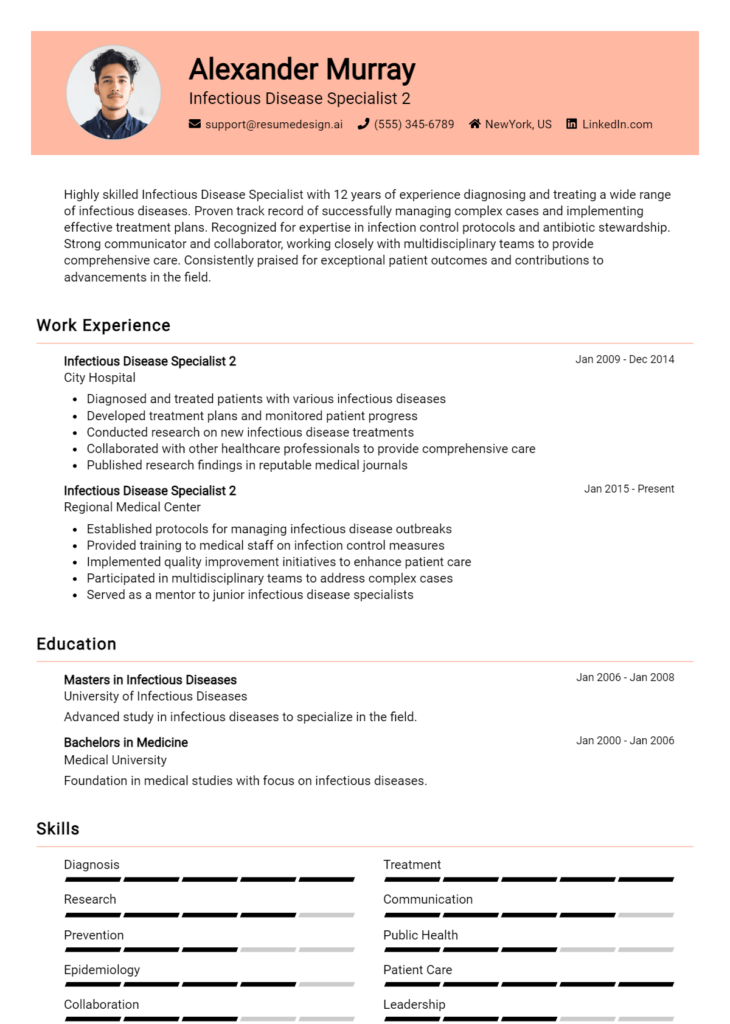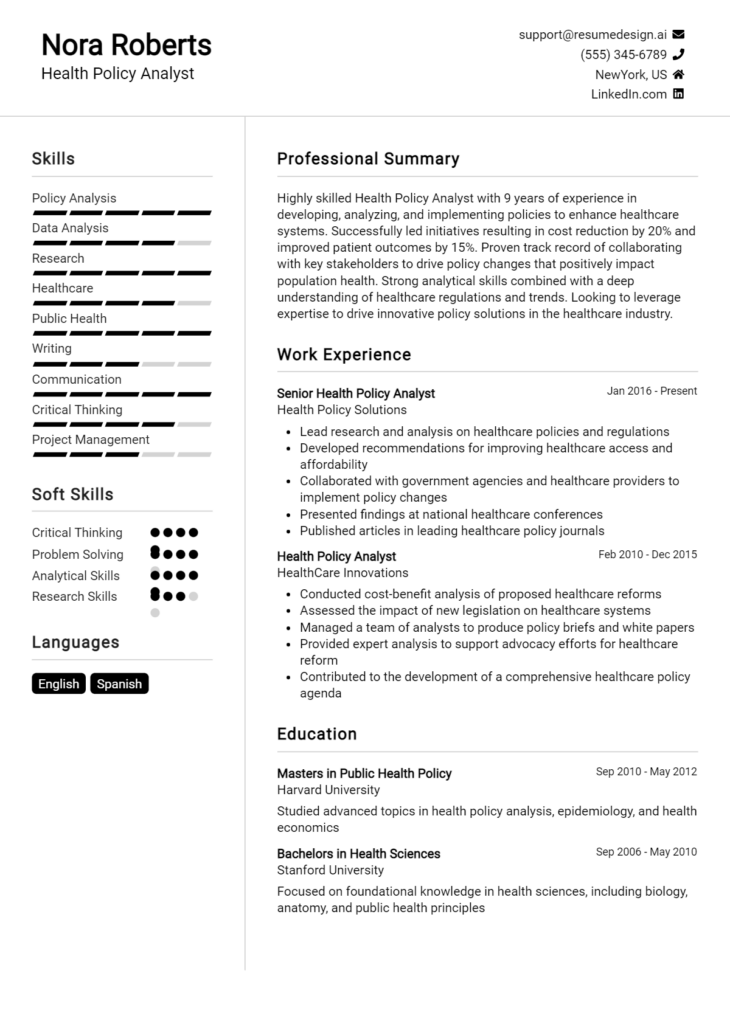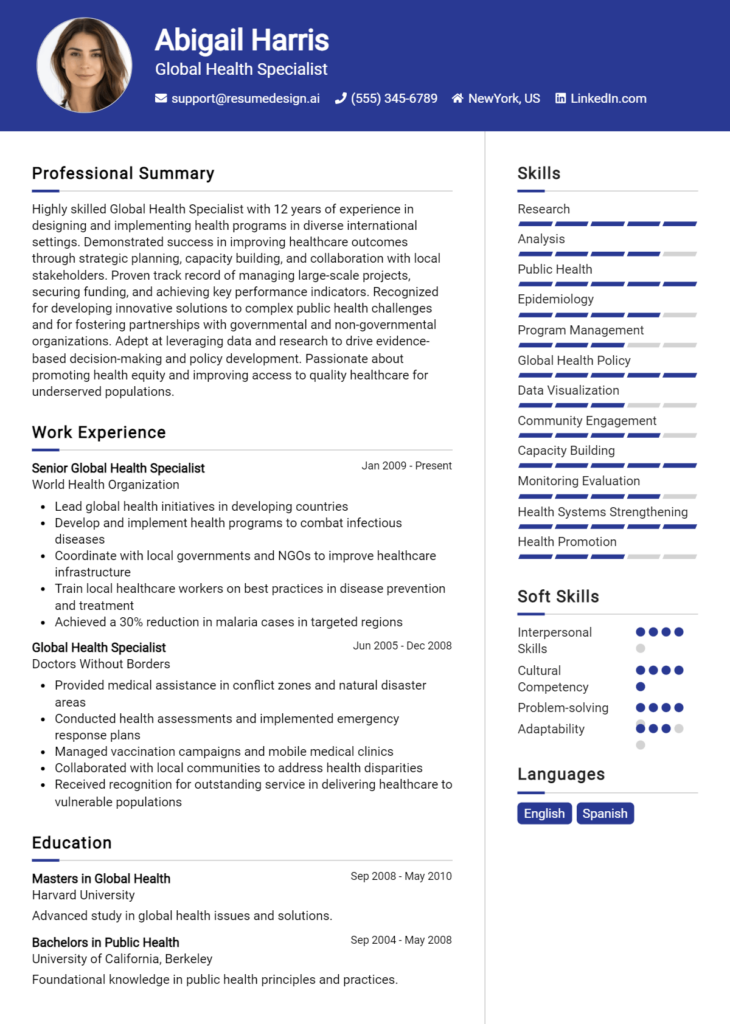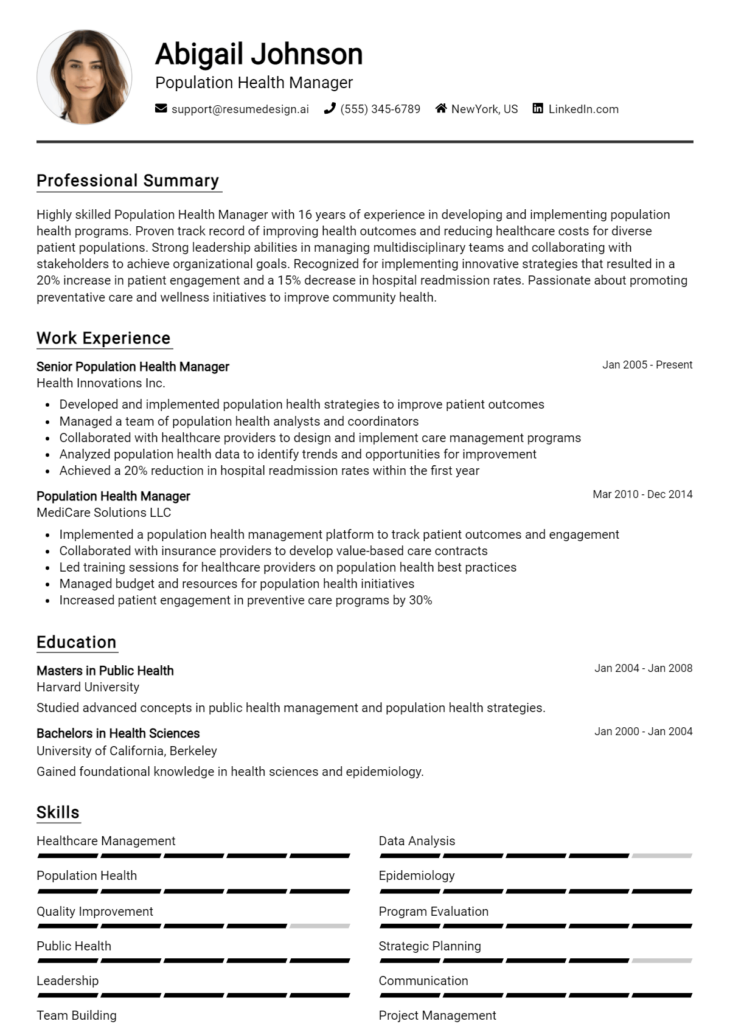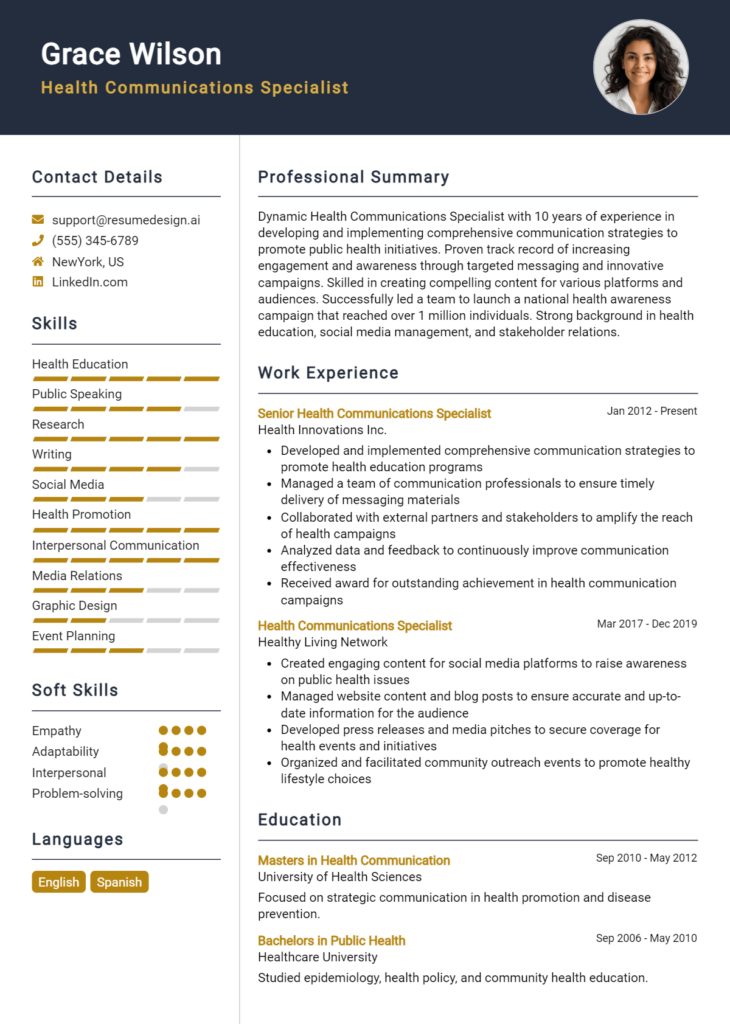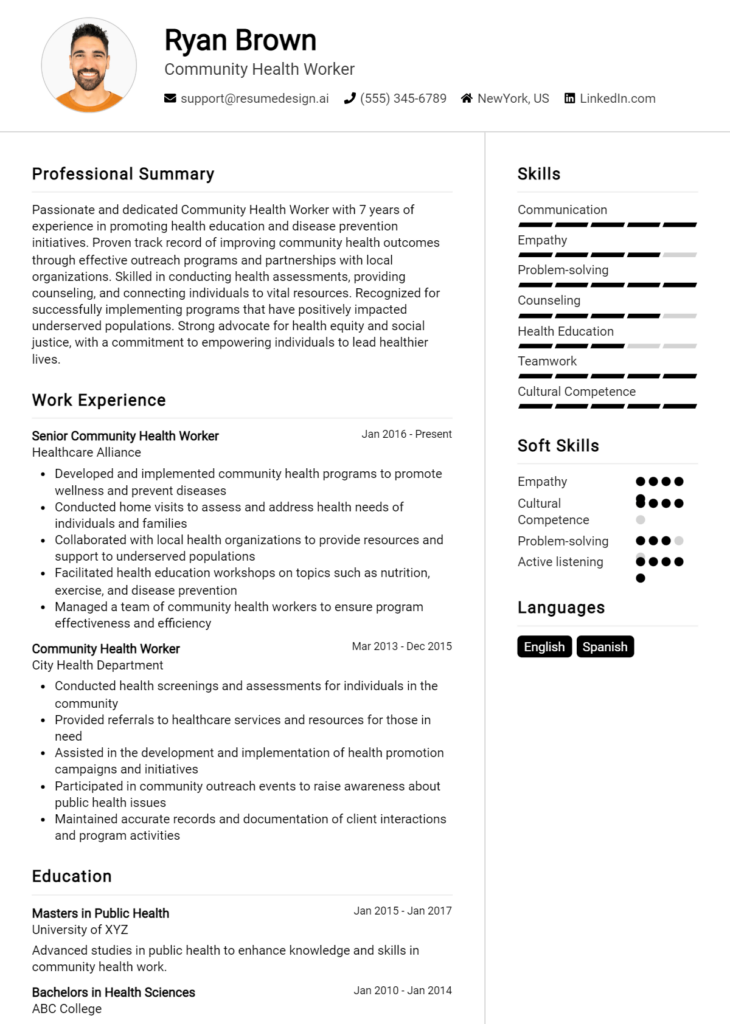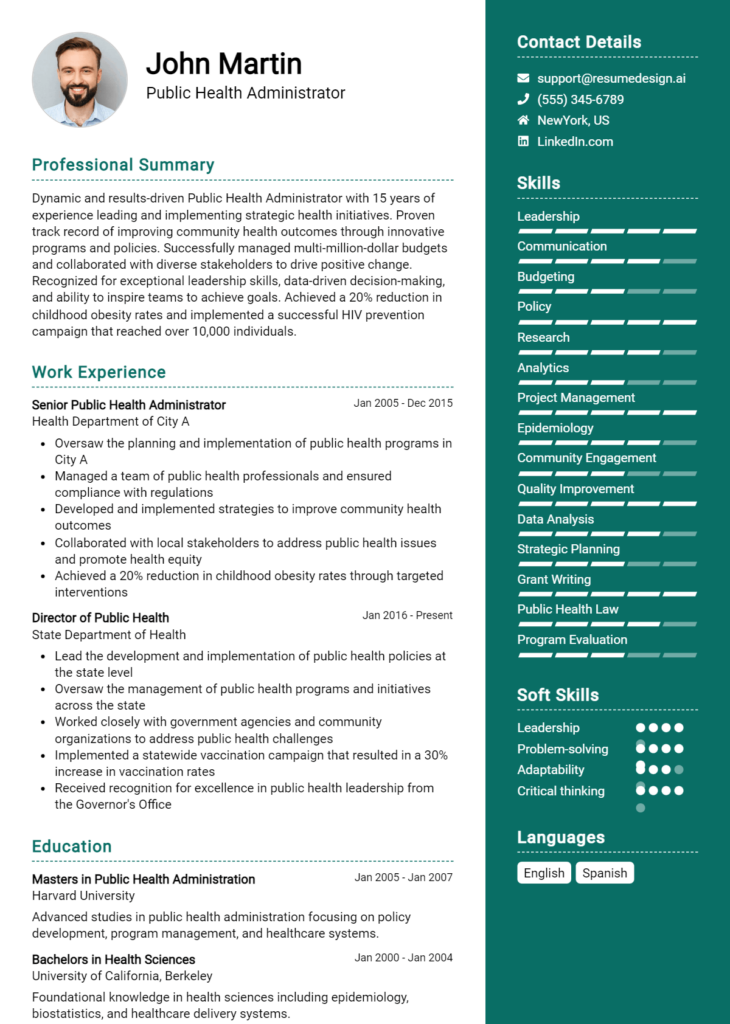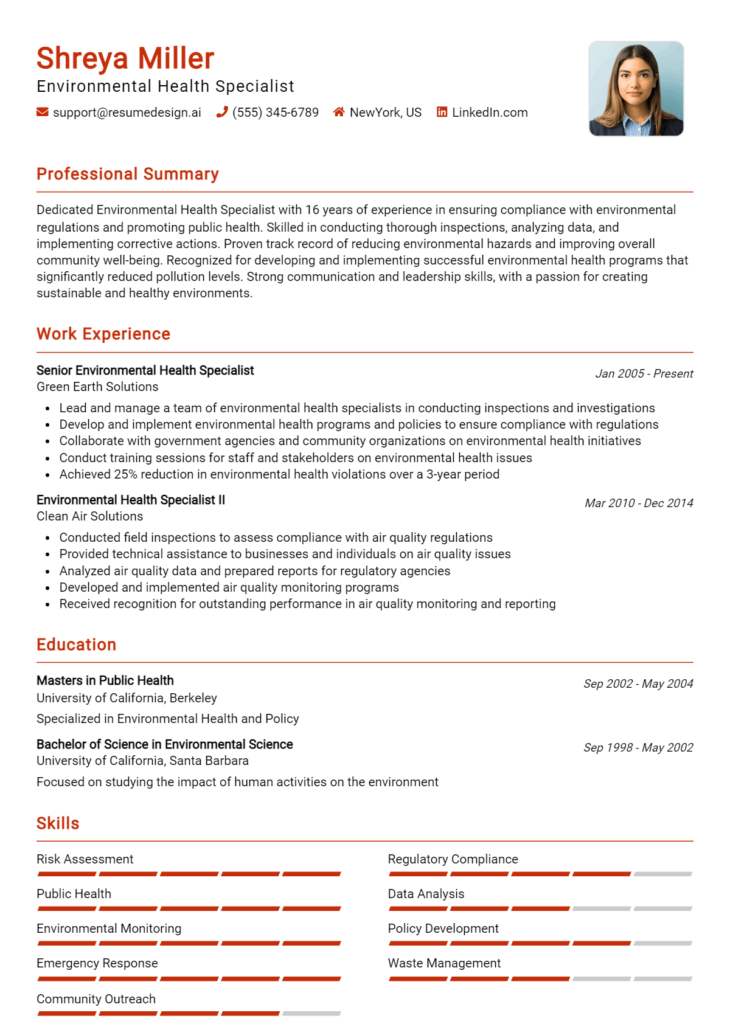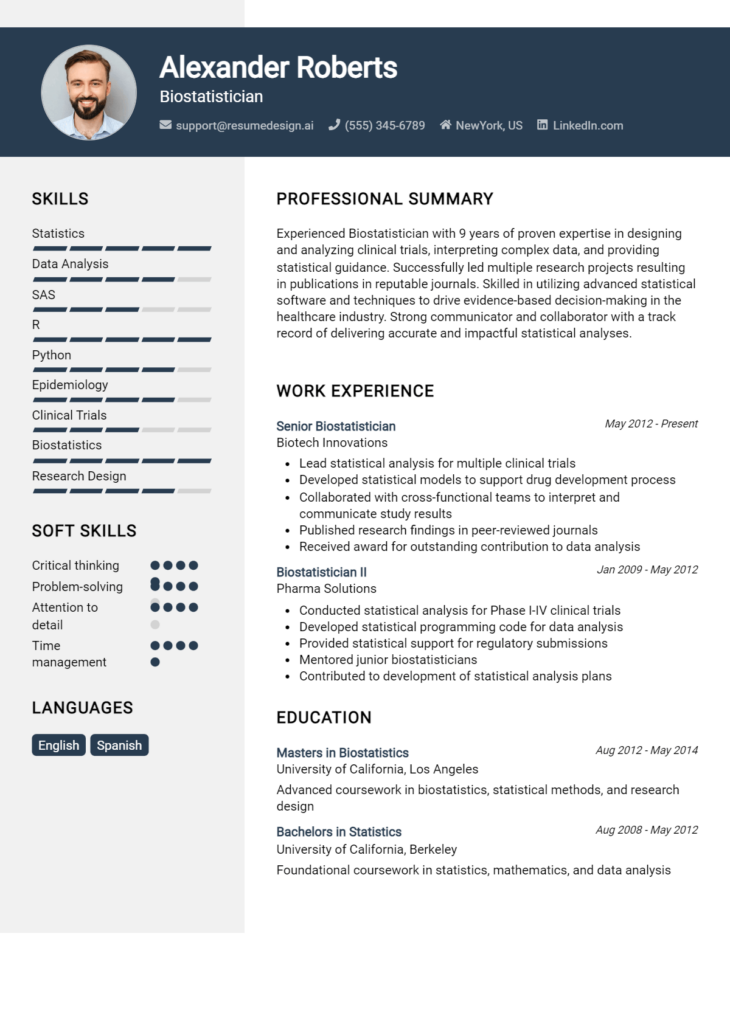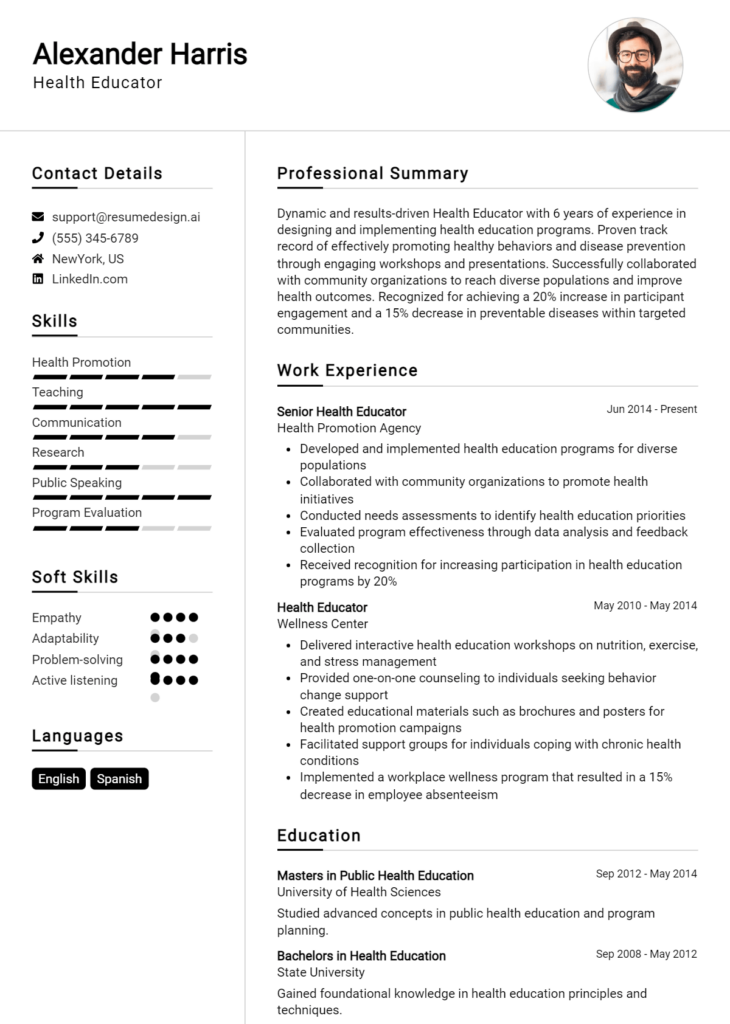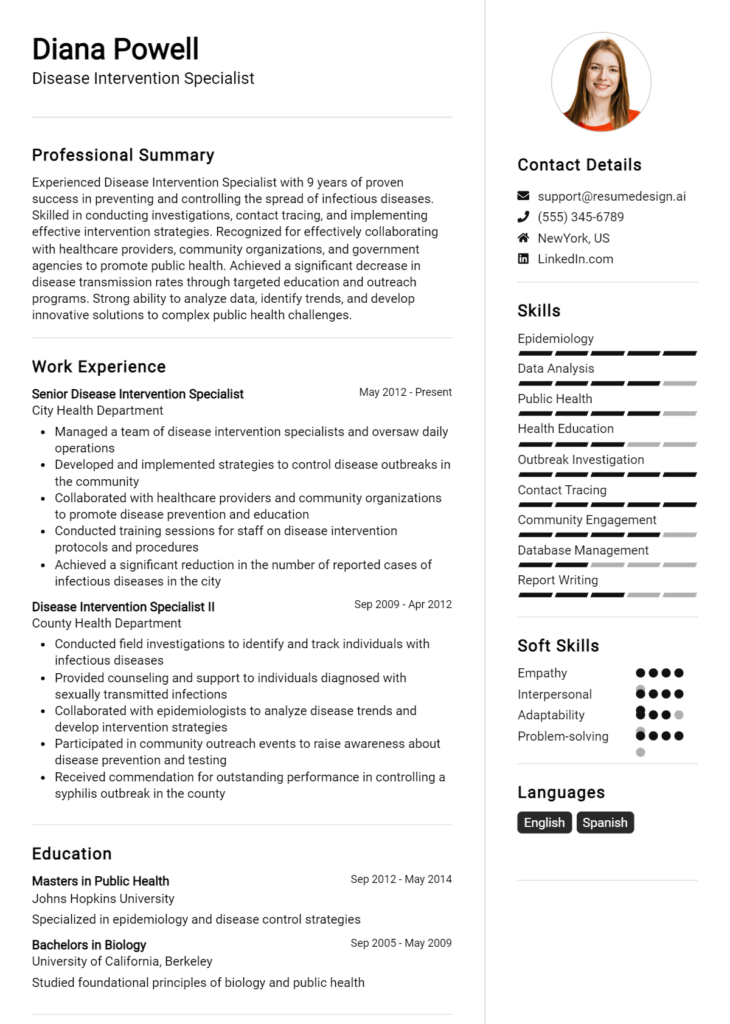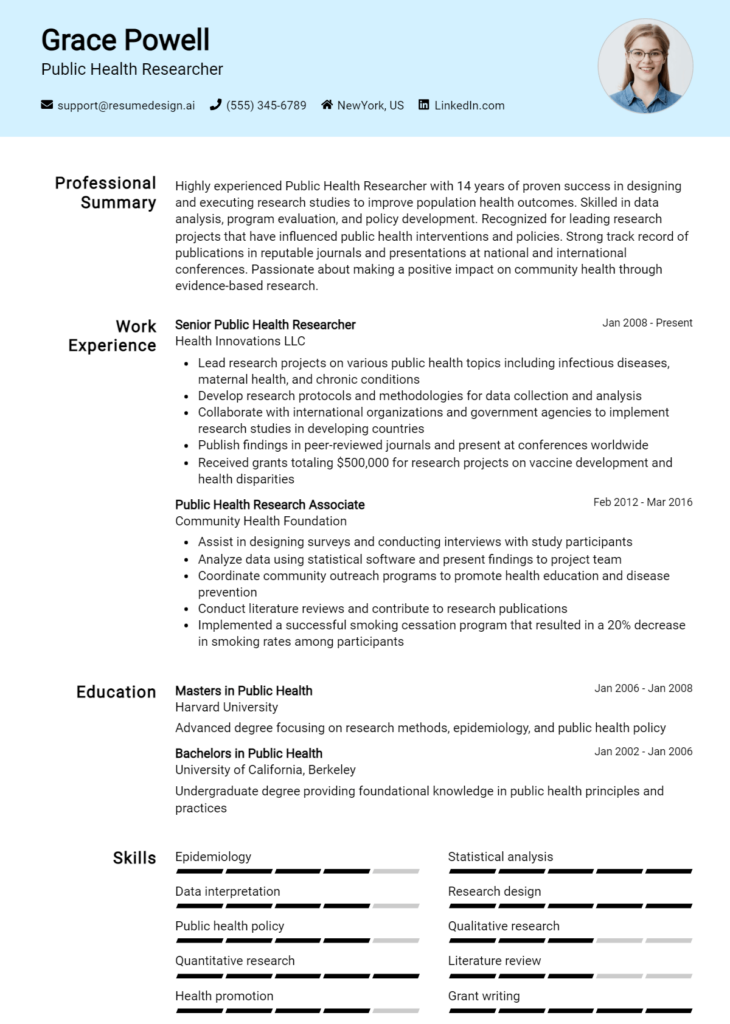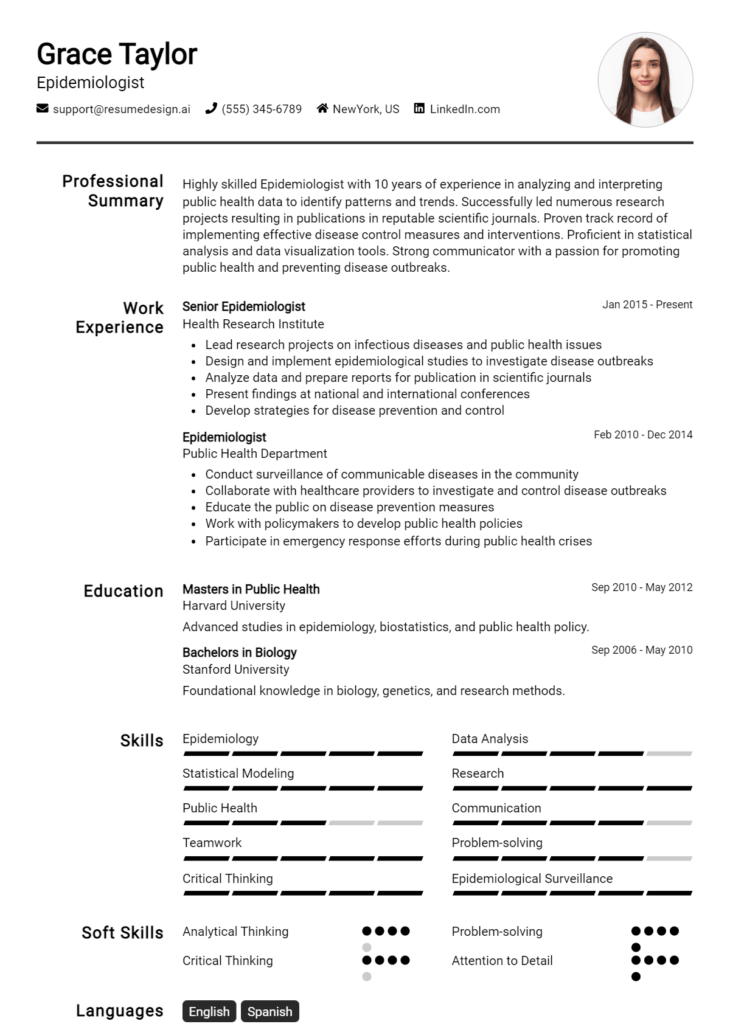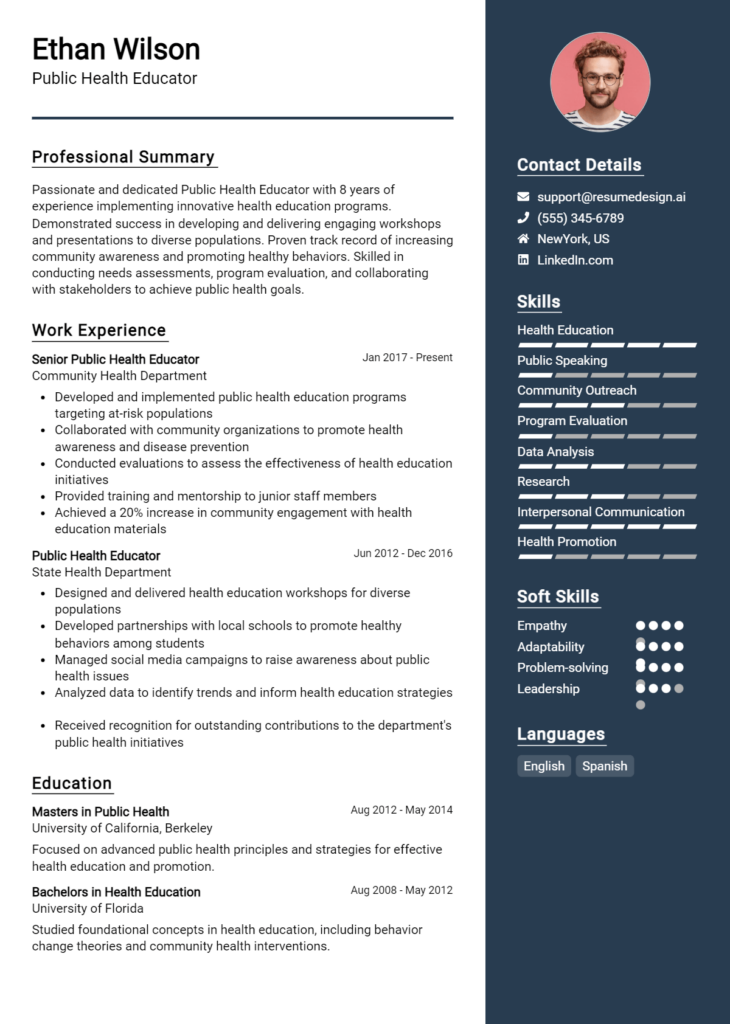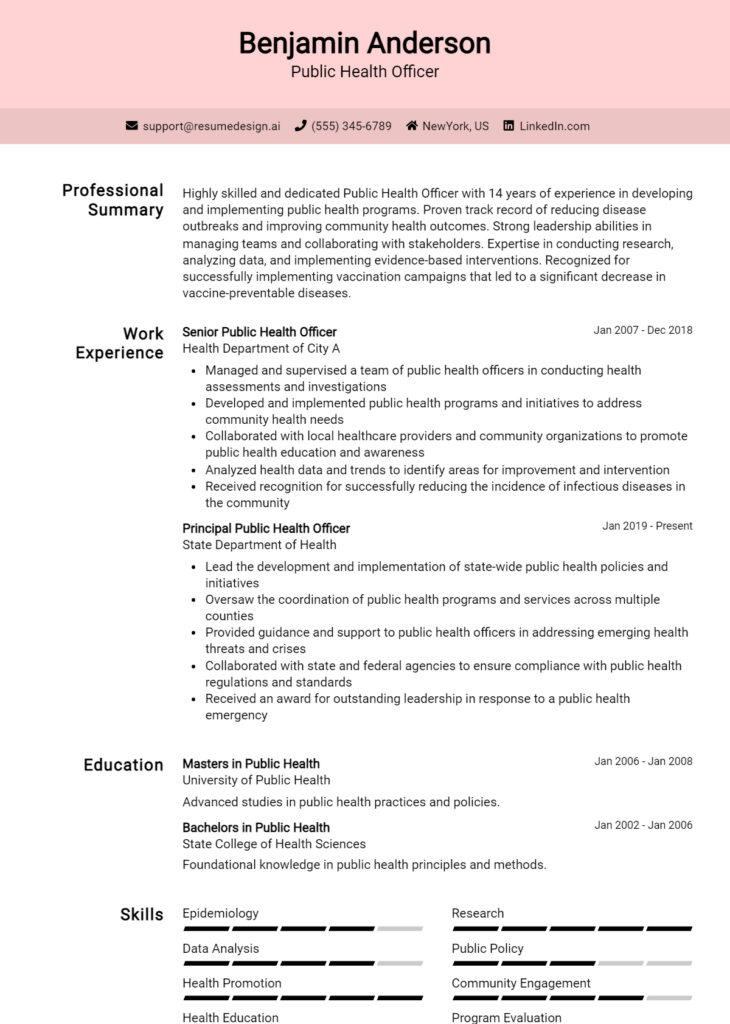Occupational Health Specialist Core Responsibilities
Occupational Health Specialists play a crucial role in fostering a safe and healthy work environment by bridging various departments, including HR, safety, and compliance. Their core responsibilities encompass assessing workplace hazards, conducting health screenings, and implementing wellness programs while requiring strong technical knowledge, operational acuity, and adept problem-solving skills. These abilities are vital for aligning health initiatives with organizational goals. A well-structured resume can effectively showcase these qualifications, demonstrating the candidate's capability to enhance workplace health and safety.
Common Responsibilities Listed on Occupational Health Specialist Resume
- Conduct workplace health assessments and risk evaluations.
- Develop and implement occupational health policies and programs.
- Monitor compliance with health regulations and standards.
- Provide training and education on health and safety practices.
- Collaborate with management to address employee health concerns.
- Conduct health screenings and maintain health records.
- Analyze health data to identify trends and recommend interventions.
- Promote wellness initiatives to enhance employee health.
- Manage work-related injury and illness cases.
- Serve as a liaison between employees and healthcare providers.
- Conduct ergonomic assessments to improve workplace design.
- Participate in emergency response planning and drills.
High-Level Resume Tips for Occupational Health Specialist Professionals
In the competitive field of Occupational Health, a well-crafted resume serves as a vital tool for professionals seeking to make their mark. Your resume is often the first impression you make on potential employers, and it must effectively reflect not only your skills but also your achievements in promoting workplace safety and health. A strong resume should convey your expertise in risk assessment, compliance, and employee wellness, setting you apart from other candidates. This guide will provide practical and actionable resume tips specifically tailored for Occupational Health Specialist professionals, ensuring that your application stands out in the hiring process.
Top Resume Tips for Occupational Health Specialist Professionals
- Tailor your resume for each job application by closely aligning your skills and experiences with the job description.
- Showcase relevant experience by highlighting specific roles and responsibilities that demonstrate your expertise in occupational health.
- Quantify your achievements with concrete metrics, such as reductions in workplace injuries or improvements in employee health outcomes.
- Highlight industry-specific certifications, such as Certified Occupational Health Nurse (COHN) or Certified Safety Professional (CSP), to enhance credibility.
- Include a professional summary that succinctly outlines your career goals and key qualifications in occupational health.
- Utilize action verbs and concise language to convey your impact and contributions in previous roles.
- Incorporate keywords from the job posting to pass Applicant Tracking Systems (ATS) and ensure your resume reaches human eyes.
- Emphasize soft skills such as communication, problem-solving, and teamwork, which are crucial in occupational health settings.
- Consider adding a section for continuing education or professional development to showcase your commitment to staying current in the field.
By implementing these tips, you can significantly enhance your resume and increase your chances of landing a job in the Occupational Health Specialist field. A tailored, achievement-focused resume not only showcases your qualifications but also demonstrates your dedication to promoting workplace well-being, making you a desirable candidate in this vital industry.
Why Resume Headlines & Titles are Important for Occupational Health Specialist
In the competitive field of occupational health, a well-crafted resume headline or title can serve as a crucial first impression for candidates seeking employment as Occupational Health Specialists. These headlines are essential as they succinctly convey a candidate's primary qualifications and areas of expertise in a single impactful phrase. A strong headline captures the attention of hiring managers, making them eager to learn more about the applicant's skills and experiences. It should be concise, relevant, and directly related to the position being applied for, effectively summarizing the candidate's qualifications in a way that resonates with the job requirements.
Best Practices for Crafting Resume Headlines for Occupational Health Specialist
- Keep it concise—aim for one impactful sentence.
- Tailor the headline to the specific job description.
- Highlight your most relevant skills and experiences.
- Use industry-specific terms and jargon to demonstrate expertise.
- Incorporate quantifiable achievements where possible.
- Avoid vague phrases; be specific about your qualifications.
- Consider including your years of experience or relevant certifications.
- Make it engaging to prompt further reading of your resume.
Example Resume Headlines for Occupational Health Specialist
Strong Resume Headlines
Dedicated Occupational Health Specialist with 10+ Years of Experience in Workplace Wellness Programs
Certified Occupational Health Nurse Specializing in Risk Assessment and Employee Safety
Results-Driven Occupational Health Professional with Proven Record in Reducing Workplace Injuries by 30%
Experienced Occupational Health Specialist Committed to Enhancing Employee Health and Compliance Standards
Weak Resume Headlines
Seeking a Job in Health
Occupational Health Specialist
Health Expert Looking for Opportunities
The strong headlines are effective because they clearly articulate the candidate’s specific skills, years of experience, and measurable accomplishments, making it easy for hiring managers to see their qualifications at a glance. In contrast, the weak headlines fail to impress due to their vagueness and lack of specificity. They do not provide any insight into the candidate's expertise or what sets them apart from other applicants, making it difficult for hiring managers to gauge their fit for the role.
Writing an Exceptional Occupational Health Specialist Resume Summary
A resume summary is a crucial component for an Occupational Health Specialist as it serves as the first impression for hiring managers. A well-crafted summary quickly captures attention by highlighting key skills, relevant experience, and notable accomplishments tailored to the job at hand. This concise and impactful paragraph should offer a snapshot of the candidate's qualifications, demonstrating not only their expertise in occupational health but also their ability to contribute to the organization's overall health and safety objectives. When tailored effectively, a strong summary can significantly enhance a candidate's chances of landing an interview.
Best Practices for Writing a Occupational Health Specialist Resume Summary
- Quantify achievements: Use specific numbers to illustrate your impact, such as the percentage reduction in workplace injuries.
- Focus on relevant skills: Highlight skills such as risk assessment, health and safety compliance, and employee wellness initiatives.
- Tailor the summary: Customize the summary for each job application to reflect the specific requirements and language used in the job description.
- Keep it concise: Aim for 3-5 sentences that deliver your key points without overwhelming the reader.
- Use action verbs: Start sentences with strong action verbs to convey your proactive approach to occupational health.
- Showcase certifications: Mention relevant certifications like Certified Occupational Health Nurse (COHN) or Occupational Health and Safety Administration (OSHA) training.
- Reflect your passion: Convey your commitment to promoting health and safety in the workplace.
- Avoid jargon: While technical terms may be relevant, ensure clarity and accessibility to a broad audience.
Example Occupational Health Specialist Resume Summaries
Strong Resume Summaries
Dynamic Occupational Health Specialist with over 7 years of experience in developing and implementing health and safety programs. Achieved a 30% reduction in workplace injuries over two years through proactive risk assessments and employee training initiatives.
Detail-oriented Occupational Health Specialist skilled in OSHA regulations and workplace safety audits. Successfully led a team to improve compliance rates by 40%, ensuring a safer workplace for over 1,000 employees.
Dedicated Occupational Health Specialist with expertise in ergonomics and wellness programs. Spearheaded a company-wide wellness initiative that increased employee participation by 50% and decreased health-related absences by 20%.
Weak Resume Summaries
Occupational Health Specialist with some experience in health and safety. Looking for a position to apply my skills.
Experienced health professional wanting to help companies with their occupational health needs.
The strong resume summaries are considered effective because they provide specific, quantifiable results and clearly demonstrate the candidate's relevant skills and achievements. These summaries are tailored to the role and contain actionable details that make the candidate stand out. Conversely, the weak summaries lack specificity and measurable outcomes, presenting a generic view of the candidate's abilities without indicating what they can uniquely offer to a potential employer.
Work Experience Section for Occupational Health Specialist Resume
The work experience section of an Occupational Health Specialist resume is a critical component that allows candidates to effectively demonstrate their technical skills, leadership capabilities, and commitment to delivering high-quality outcomes. This section not only highlights the candidate's relevant experiences but also provides tangible evidence of their ability to manage teams, implement health programs, and comply with industry standards. By quantifying achievements and aligning their experiences with the requirements of the occupational health field, candidates can create a compelling narrative that captures the attention of hiring managers and showcases their qualifications.
Best Practices for Occupational Health Specialist Work Experience
- Emphasize technical expertise by listing relevant certifications and specialized training.
- Quantify results by using metrics (e.g., percentage of reduced workplace injuries, number of health assessments conducted).
- Highlight leadership roles where you managed teams or projects.
- Showcase collaboration with other departments, such as HR or safety teams, to enhance workplace health initiatives.
- Include specific examples of successful health programs you developed or improved.
- Align your experiences with industry standards and best practices in occupational health.
- Use action verbs to convey a sense of proactivity and impact in your roles.
- Tailor your work experience to address the specific needs and challenges of the prospective employer.
Example Work Experiences for Occupational Health Specialist
Strong Experiences
- Developed and implemented a workplace wellness program that reduced employee absenteeism by 25% over two years.
- Led a cross-functional team to achieve ISO 45001 certification, improving safety compliance by 40% across all departments.
- Conducted over 300 health risk assessments annually, providing actionable insights that decreased occupational hazards by 30%.
- Collaborated with management and staff to establish ergonomic solutions, resulting in a 50% reduction in musculoskeletal disorders.
Weak Experiences
- Responsible for health and safety tasks in the workplace.
- Assisted with various projects related to employee health.
- Participated in team meetings about health initiatives.
- Helped implement some health programs at the company.
The examples above illustrate the distinction between strong and weak experiences in an Occupational Health Specialist resume. Strong experiences are characterized by specific, quantifiable outcomes that demonstrate the candidate's technical expertise and leadership skills. They provide context and measurable results, making a compelling case for the candidate's capabilities. Conversely, weak experiences lack detail and fail to convey significant contributions or achievements, making them less impactful to potential employers.
Education and Certifications Section for Occupational Health Specialist Resume
The education and certifications section of an Occupational Health Specialist resume is crucial, as it serves to demonstrate the candidate's academic qualifications and commitment to professional development within the field. This section highlights not only the foundational knowledge acquired through formal education but also showcases industry-relevant certifications and ongoing learning efforts that are essential for staying current with best practices and regulations. By providing detailed information about relevant coursework, specialized training, and recognized credentials, candidates can significantly enhance their credibility and alignment with the job role, making them more attractive to potential employers.
Best Practices for Occupational Health Specialist Education and Certifications
- Prioritize relevant degrees, such as a Master's in Public Health or Occupational Health.
- List industry-recognized certifications like Certified Occupational Health Nurse (COHN) or Certified Safety Professional (CSP).
- Include specific coursework that relates to occupational health, safety regulations, and risk assessment.
- Highlight any advanced training or workshops that showcase specialized skills relevant to the role.
- Use clear and concise formatting to enhance readability and make key qualifications stand out.
- Stay current with certifications by listing renewal dates or upcoming training to demonstrate commitment to continuous learning.
- Tailor the education and certifications section to align with the job description and required qualifications.
- Avoid including irrelevant certifications or outdated qualifications that do not pertain to occupational health.
Example Education and Certifications for Occupational Health Specialist
Strong Examples
- Master of Public Health (MPH) with a concentration in Occupational Health, University of XYZ, 2020.
- Certified Occupational Health Nurse (COHN), American Board for Occupational Health Nurses, 2021.
- Advanced Certificate in Industrial Hygiene, Institute of Occupational Safety and Health, 2022.
- Relevant Coursework: Occupational Safety, Risk Assessment, and Health Promotion Strategies.
Weak Examples
- Bachelor of Arts in Sociology, University of ABC, 2015.
- Certification in Basic First Aid, Red Cross, 2018.
- Outdated OSHA 10-Hour General Industry Training, completed in 2015.
- Certification in Food Safety Management, 2019.
The strong examples listed above are considered effective because they directly relate to the skills and knowledge required for an Occupational Health Specialist role, demonstrating relevant education and certifications that enhance the candidate's qualifications. Conversely, the weak examples fail to align with the industry’s needs; they either represent unrelated fields of study or certifications that do not significantly contribute to the expertise required in occupational health, thereby diminishing the candidate's appeal to employers in this specialized area.
Top Skills & Keywords for Occupational Health Specialist Resume
As an Occupational Health Specialist, possessing a diverse array of skills is crucial for effectively promoting health and safety in various workplaces. A well-crafted resume highlights both hard and soft skills, showcasing a candidate's ability to analyze health hazards, implement safety protocols, and communicate effectively with employees and management. By emphasizing these competencies, potential employers can quickly identify a candidate's suitability for the role, making it essential to tailor your resume with relevant skills that align with the job requirements. For a deeper dive into how to incorporate skills and work experience into your resume, consider the following key skills that define successful Occupational Health Specialists.
Top Hard & Soft Skills for Occupational Health Specialist
Soft Skills
- Strong Communication Skills
- Problem-Solving Abilities
- Empathy and Compassion
- Attention to Detail
- Leadership and Team Management
- Adaptability and Flexibility
- Time Management
- Conflict Resolution
- Critical Thinking
- Decision-Making Skills
Hard Skills
- Knowledge of Occupational Health Regulations
- Risk Assessment and Management
- First Aid and CPR Certification
- Data Analysis and Interpretation
- Familiarity with Health and Safety Standards (OSHA, NIOSH)
- Ergonomic Assessment
- Health Promotion and Wellness Program Development
- Environmental Health Knowledge
- Medical Surveillance and Monitoring
- Report Writing and Documentation Skills
Stand Out with a Winning Occupational Health Specialist Cover Letter
Dear Hiring Manager,
I am writing to express my interest in the Occupational Health Specialist position at [Company Name], as advertised on [Job Board/Company Website]. With a Bachelor’s degree in Occupational Health and Safety and over five years of experience in the field, I am confident in my ability to contribute effectively to your team. My expertise in conducting workplace assessments, implementing health and safety programs, and ensuring compliance with regulatory standards aligns with your organization's commitment to maintaining a safe and healthy work environment.
In my previous role at [Previous Company Name], I successfully led initiatives that reduced workplace injuries by 30% over two years by developing tailored health programs and conducting regular training sessions. My ability to analyze data and identify potential hazards allowed me to implement proactive measures that not only protected employees but also improved overall productivity. I pride myself on my strong communication skills, which enable me to educate and engage employees at all levels, fostering a culture of safety and well-being within the organization.
I am excited about the opportunity to bring my skills and passion for occupational health to [Company Name]. I am particularly impressed by your commitment to employee wellness and your innovative approaches to health and safety. I believe that my proactive approach and dedication to continuous improvement would make a meaningful contribution to your team. I look forward to the possibility of discussing how my background, skills, and enthusiasms align with the goals of [Company Name].
Thank you for considering my application. I hope to speak with you soon to further discuss how I can add value to your organization as an Occupational Health Specialist.
Sincerely,
[Your Name]
[Your Phone Number]
[Your Email Address]
Common Mistakes to Avoid in a Occupational Health Specialist Resume
When crafting a resume for the role of an Occupational Health Specialist, it's essential to present your qualifications and experience clearly and professionally. However, many candidates make common mistakes that can hinder their chances of landing an interview. Avoiding these pitfalls can significantly enhance the effectiveness of your resume and help you stand out in a competitive job market. Here are some common mistakes to watch out for:
Generic Objectives: Using vague or generic career objectives fails to showcase your specific interest in occupational health. Tailor your objective to align with the job requirements and demonstrate your passion for the field.
Ignoring Keywords: Failing to incorporate relevant keywords from the job description can result in your resume being filtered out by Applicant Tracking Systems (ATS). Make sure to include industry-specific terms and phrases that highlight your expertise.
Overloading with Jargon: While it's essential to demonstrate your knowledge, overusing technical jargon can alienate readers who may not be familiar with the terminology. Aim for a balance between professional language and clarity.
Poor Formatting: A cluttered or unprofessional layout can detract from the content of your resume. Use clear headings, bullet points, and consistent fonts to enhance readability and present a polished image.
Lack of Quantifiable Achievements: Simply listing job duties without showcasing specific accomplishments fails to illustrate your impact. Use numbers and statistics to highlight your contributions, such as improved safety compliance rates or reduced workplace injuries.
Neglecting Education and Certifications: Occupational Health Specialists often require specific qualifications. Failing to prominently display your relevant degrees, certifications, and ongoing training can make your application less compelling. Ensure this information is easily accessible.
Excessive Length: A resume that is too lengthy can overwhelm hiring managers. Aim for a concise document that focuses on relevant experience and skills, typically one to two pages in length.
Typos and Errors: Spelling and grammatical mistakes can create a negative impression and suggest a lack of attention to detail. Always proofread your resume or use professional editing tools to ensure it is error-free.
Conclusion
As an Occupational Health Specialist, your role is crucial in promoting health and safety in the workplace. You are responsible for assessing workplace environments, identifying potential hazards, and implementing effective health programs to ensure employee well-being. Key aspects of this position include conducting health assessments, providing recommendations for workplace improvements, and ensuring compliance with health regulations.
Additionally, you may collaborate with various departments to develop training programs aimed at educating employees about health risks and best practices. Staying updated on the latest regulations and advancements in occupational health is essential for success in this field.
In conclusion, as you reflect on your qualifications and experiences, now is the perfect time to review your Occupational Health Specialist resume. Ensure it highlights your skills, achievements, and certifications relevant to this vital role. Utilize available resources to enhance your application materials. Check out resume templates for a professional layout, try the resume builder to create a tailored resume, explore resume examples for inspiration, and consider using cover letter templates for a compelling introduction. Take action today and make your resume stand out in the competitive field of occupational health!

